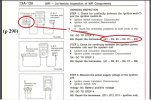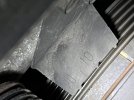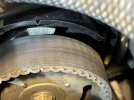I had to drop everything and go on a 2-week worktrip, in the meantime I had the starter freshly rebuilt. Both the starter itself, and the solenoid, were toast.
Installed it, and although the enthusiasm and note of the starter is crisp, new, and robust, the halting labored fast-slow-fast-slow pattern remains.
So, the failing starter, was not causing a bizarre electrical drain that affects the ignition.
I am now on to the crank position sensor, and I do have another that I can swap in if need be, but I will be testing the current one as thoroughly as possible.
If I plug in the uninstalled sensor, the cranking is smooth, fast, and consistent (although it is not contributing a crank position signal) and behaves the same way as if the currently installed sensor were unplugged.
I took the plastic cam gear cover off, and the timing belt looks good and tight.
Installed it, and although the enthusiasm and note of the starter is crisp, new, and robust, the halting labored fast-slow-fast-slow pattern remains.
So, the failing starter, was not causing a bizarre electrical drain that affects the ignition.
I am now on to the crank position sensor, and I do have another that I can swap in if need be, but I will be testing the current one as thoroughly as possible.
If I plug in the uninstalled sensor, the cranking is smooth, fast, and consistent (although it is not contributing a crank position signal) and behaves the same way as if the currently installed sensor were unplugged.
I took the plastic cam gear cover off, and the timing belt looks good and tight.
Last edited:




